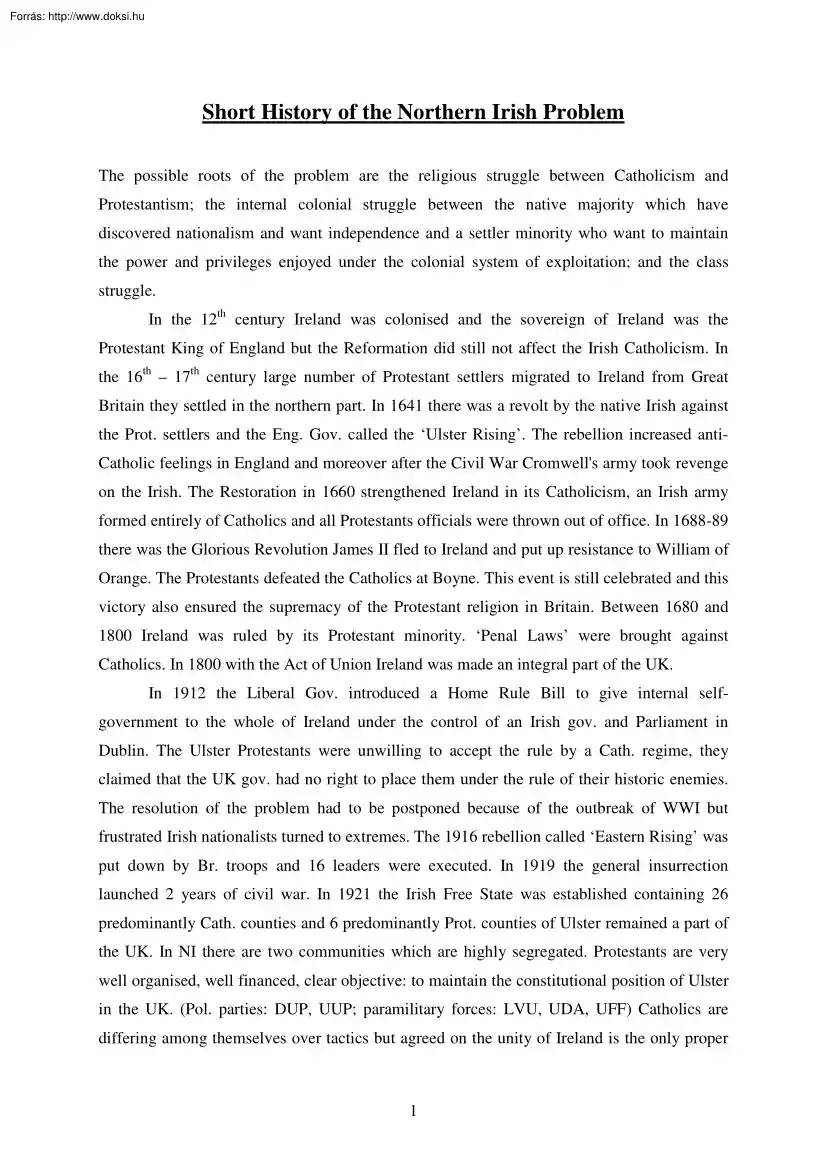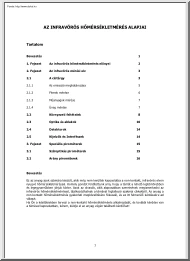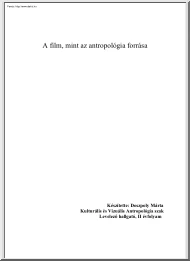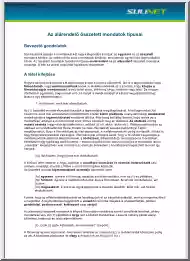Please log in to read this in our online viewer!

Please log in to read this in our online viewer!
No comments yet. You can be the first!
What did others read after this?
Content extract
Short History of the Northern Irish Problem The possible roots of the problem are the religious struggle between Catholicism and Protestantism; the internal colonial struggle between the native majority which have discovered nationalism and want independence and a settler minority who want to maintain the power and privileges enjoyed under the colonial system of exploitation; and the class struggle. In the 12th century Ireland was colonised and the sovereign of Ireland was the Protestant King of England but the Reformation did still not affect the Irish Catholicism. In the 16th – 17th century large number of Protestant settlers migrated to Ireland from Great Britain they settled in the northern part. In 1641 there was a revolt by the native Irish against the Prot. settlers and the Eng Gov called the ‘Ulster Rising’ The rebellion increased antiCatholic feelings in England and moreover after the Civil War Cromwell's army took revenge on the Irish. The Restoration in 1660
strengthened Ireland in its Catholicism, an Irish army formed entirely of Catholics and all Protestants officials were thrown out of office. In 1688-89 there was the Glorious Revolution James II fled to Ireland and put up resistance to William of Orange. The Protestants defeated the Catholics at Boyne This event is still celebrated and this victory also ensured the supremacy of the Protestant religion in Britain. Between 1680 and 1800 Ireland was ruled by its Protestant minority. ‘Penal Laws’ were brought against Catholics. In 1800 with the Act of Union Ireland was made an integral part of the UK In 1912 the Liberal Gov. introduced a Home Rule Bill to give internal selfgovernment to the whole of Ireland under the control of an Irish gov and Parliament in Dublin. The Ulster Protestants were unwilling to accept the rule by a Cath regime, they claimed that the UK gov. had no right to place them under the rule of their historic enemies The resolution of the problem had to be postponed
because of the outbreak of WWI but frustrated Irish nationalists turned to extremes. The 1916 rebellion called ‘Eastern Rising’ was put down by Br. troops and 16 leaders were executed In 1919 the general insurrection launched 2 years of civil war. In 1921 the Irish Free State was established containing 26 predominantly Cath. counties and 6 predominantly Prot counties of Ulster remained a part of the UK. In NI there are two communities which are highly segregated Protestants are very well organised, well financed, clear objective: to maintain the constitutional position of Ulster in the UK. (Pol parties: DUP, UUP; paramilitary forces: LVU, UDA, UFF) Catholics are differing among themselves over tactics but agreed on the unity of Ireland is the only proper 1 solution. (pol parties: Sinn Fein, SDLP, The Workers Party, paramilitaries: 3 kind of IRA) In 1969 terrorist activity increased in NI. In 1972 as a result of the Bloody Sunday Br gov decided to introduce direct rule and
suspended NI Parliament thus NI became controlled by the Secretary of State for Northern Ireland from London. The Anglo-Irish Agreement in 1985 was also a failure because of the Protestant opposition. In 1993 the Downing Street Declaration established a framework for peace negotiations, issued by Br. and Irish PM In 1994 IRA made cease-fire and this was the real beginning of peace talks but in 1996 IRA ended it by bombing London’s Docklands district, then Sinn Fein started peace negotiations again in Belfast. In 1998 The Good Friday Agreement all major participants were ready to get rid of traditional attitudes, they accepted non-violence and the ‘consent principle’. In 1998 new Northern Ireland Assembly was set up. In 1999 NI Government was set up (including Sinn Fein), the power was passed from Westminster to Belfast. However there are many progress there is still no solution on decommissioning because of the continuous violence by the Real IRA. 2
strengthened Ireland in its Catholicism, an Irish army formed entirely of Catholics and all Protestants officials were thrown out of office. In 1688-89 there was the Glorious Revolution James II fled to Ireland and put up resistance to William of Orange. The Protestants defeated the Catholics at Boyne This event is still celebrated and this victory also ensured the supremacy of the Protestant religion in Britain. Between 1680 and 1800 Ireland was ruled by its Protestant minority. ‘Penal Laws’ were brought against Catholics. In 1800 with the Act of Union Ireland was made an integral part of the UK In 1912 the Liberal Gov. introduced a Home Rule Bill to give internal selfgovernment to the whole of Ireland under the control of an Irish gov and Parliament in Dublin. The Ulster Protestants were unwilling to accept the rule by a Cath regime, they claimed that the UK gov. had no right to place them under the rule of their historic enemies The resolution of the problem had to be postponed
because of the outbreak of WWI but frustrated Irish nationalists turned to extremes. The 1916 rebellion called ‘Eastern Rising’ was put down by Br. troops and 16 leaders were executed In 1919 the general insurrection launched 2 years of civil war. In 1921 the Irish Free State was established containing 26 predominantly Cath. counties and 6 predominantly Prot counties of Ulster remained a part of the UK. In NI there are two communities which are highly segregated Protestants are very well organised, well financed, clear objective: to maintain the constitutional position of Ulster in the UK. (Pol parties: DUP, UUP; paramilitary forces: LVU, UDA, UFF) Catholics are differing among themselves over tactics but agreed on the unity of Ireland is the only proper 1 solution. (pol parties: Sinn Fein, SDLP, The Workers Party, paramilitaries: 3 kind of IRA) In 1969 terrorist activity increased in NI. In 1972 as a result of the Bloody Sunday Br gov decided to introduce direct rule and
suspended NI Parliament thus NI became controlled by the Secretary of State for Northern Ireland from London. The Anglo-Irish Agreement in 1985 was also a failure because of the Protestant opposition. In 1993 the Downing Street Declaration established a framework for peace negotiations, issued by Br. and Irish PM In 1994 IRA made cease-fire and this was the real beginning of peace talks but in 1996 IRA ended it by bombing London’s Docklands district, then Sinn Fein started peace negotiations again in Belfast. In 1998 The Good Friday Agreement all major participants were ready to get rid of traditional attitudes, they accepted non-violence and the ‘consent principle’. In 1998 new Northern Ireland Assembly was set up. In 1999 NI Government was set up (including Sinn Fein), the power was passed from Westminster to Belfast. However there are many progress there is still no solution on decommissioning because of the continuous violence by the Real IRA. 2




 When reading, most of us just let a story wash over us, getting lost in the world of the book rather than paying attention to the individual elements of the plot or writing. However, in English class, our teachers ask us to look at the mechanics of the writing.
When reading, most of us just let a story wash over us, getting lost in the world of the book rather than paying attention to the individual elements of the plot or writing. However, in English class, our teachers ask us to look at the mechanics of the writing.